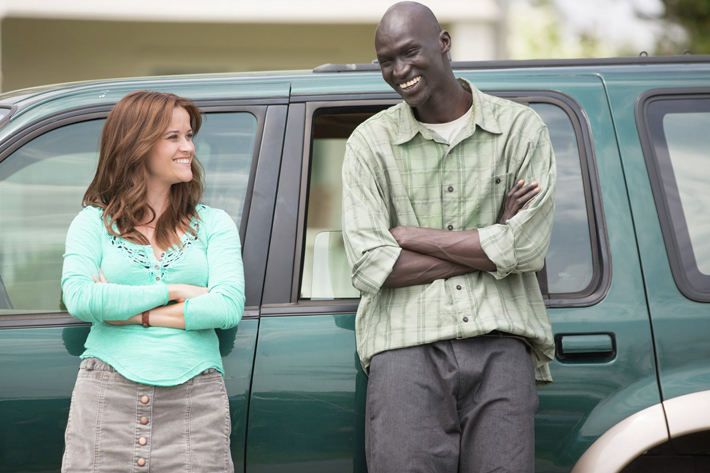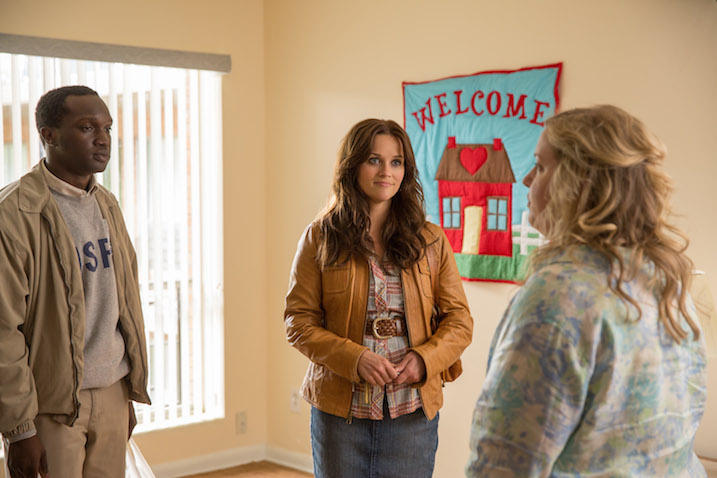Alerts & Newsletters
By providing your information, you agree to our Terms of Use and our Privacy Policy. We use vendors that may also process your information to help provide our services. This site is protected by reCAPTCHA Enterprise and the Google Privacy Policy and Terms of Service apply.
‘The Good Lie’ is Not ‘The Blind Side’ and Reese Witherspoon is Not the Star
'The Good Lie' is Not 'The Blind Side' and Reese Witherspoon is Not the Star

“This isn’t the past – unfortunately, some version of this is the present,” Samantha Power, the U.S. Ambassador to the United Nations, said in introducing Philippe Falardeau’s “The Good Lie” at its New York premiere, hosted by Warner Bros. and UNICEF, on Tuesday. “It’s a remarkable work,” she continued,” a remarkable film to bridge what many of us experience here, in North America in the luxury of our comfortable lives, and the unimaginable horror and fear that so many people are living with, the South Sudanese living under fire from the government of Sudan… but it’s also a reminder of the power each of us has as a citizen to do something good.”
The new film (produced by Ron Howard and starring Reese Witherspoon) follows three Sudanese refugees who escape during the Second Civil War in Sudan (1983-2005) and miraculously make it to America years later. The real-life 20,000 children (mostly boys) who escaped the war were given the name, “The Lost Boys of Sudan.” Four cast members (Arnold Oceng, Emmanuel Jal, Ger Duang, and Kuoth Weil), writer Margaret Nagle, and producers Karen Sherwood, Molly Smith and Trent Luckinbill were present to talk about the crazy-lengthy process of making this movie, following the screening. As actress (and real-life refugee) Kuoth Wiel said, “Watching this film – it’s all of our lives… it’s a testament to our survival. I’m glad the world can see what the Sudanese people have gone through.” Here’s what we learned from the film, Q&A and after party.
This is not “The Blind Side,” and Reese Witherspoon is not the star.

Indiewire spoke to producer Trent Luckinbill about the constant comparisons this movie is drawing to 2009’s “The Blind Side.” Both of us immediately agreed: this is not that film at all (and by the way, the “good lie” is not told by Witherspoon, but comes as a touching surprise from one of the true leads in the end). “It’s their story at the center of this film,” said Trent. “Reese was really great, she said ‘I’m not the star of this story, this is not mine, but if I can help really get it out there, I’m so in.’ So that’s what people are drawn to, but that’s good – she wants to make their stories heard.”
Several studios said no to “The Good Lie.”
If this film is a baby, it was an 11-year pregnancy, according to Margaret Nagle. “I got the job in 2003. It was my first paid job as a writer, it was a job I wanted desperately… I just immersed myself in everything about this story.” Unfortunately, during pre-production, her producer (Bobby Newmire) died unexpectedly, and the project was put into turnaround. But there’s a “little-known rule,” she explained, in the Writer’s Guild of America, stating that you can get something out after five years. She waited, got it back, and “Karen Sherwood rescued it from the scrap pile, and brought it to Molly and Trent.”

But even that took forever. “It’s difficult to get films made when they’re truly about Africa, and not really about America,” said Karen Sherwood. “As time went on, though, it became even more and more unusual for a studio to put out this kind of film. But independent studios started to crop up, saying ‘We’ll do this, we’ll pay for this.’ And Molly Smith runs a company (Black Label Media) that tells those stories.”
Smith herself told us she had a personal connection with the story – her sister met three Lost Boys in the backroom of her local church in Tennessee. “Had she not met them, and had one of them really not become like my adopted brother… I don’t know what the script would have been like. But when I read it, I knew, and I just fell in love with it. And Margaret told it in a way that just invites a larger audience in. She told it with heart and humor, and really took you on a journey with these children.” At this point, Nagle leaned in a said, “When I heard Molly Smith’s brother was a Lost Boy, I was like, ‘Hallelujah, the wind is gonna turn for this project.'”
Luckinbill also told Indiewire, “It’s half promotional, about the Lost Boys, and then half a story – that’s unusual, and a little risky, so that’s why so many people said no to it.” And Sherwood added, “You can’t really put it in a box. But that’s what’s unique about it. It’s actually its greatest strength.”
Arnold Oceng was originally told he was too short for the lead role.
Oceng, an actor who hails from the UK, was doing a play in London when a fellow actor told him about the script. When Oceng’s his agent put him up for a role, he was originally told no. “They said ‘You’re too short!’ So I was bummed for days about that.” But a month later, they changed their minds, saying his tape was the only tape they liked from all auditions in Europe. “It was mind-blowing. One day I was in South London eating chicken and chips, and then the next day I’m in LA with Ger and Emmanuel, reading with Reese Witherspoon!” His personal connection? His family was refugees, and his father died Oceng was two years old. “When he died, I closed the door on my Sudanese heritage; me being part of this movie was reopening that book. It was like a tribute to my father. I’m doing it to honor him, to learn about him. And I feel ashamed because when I first heard about this script, I didn’t even know about the Lost Boys, I didn’t even know about the killings and the genocide that was going on. I was like a sponge, soaking up all I could learn from Emmanuel, Ger, and Kuoth. I was learning so much – I loved it.”
Emmanuel Jal told the audience not to sell their souls, and Ger Duang declared, “I’m a lost boy for real.”


Echoing Kuoth Weil, Ger Duang told us, “Watching this movie – it’s pretty much parallel to my life story.” Describing his journey through Ethiopia, Kenya, and South Sudan, he said in the Q&A, “It never occurred to me that I could sit here in front of you guys, that I could talk about our civil war, the thing that claimed over 2.5 million people.” When he came to America in 1994, he explained, “That was the only time I was never hearing a gun shot… When I arrived, I had to admit, ‘I’m a lost boy for real.’ I remember the first time in JFK airport. I thought, ‘I can’t believe I’ll still live in New York after today!'” Ger went back to Sudan for the first time in 18 years to vote. “My brothers and sisters, most of them still live in the refugee camp where they were born, so I’m here to promote the movie, I wanted to tell you all about what’s going on on the ground.”
Emmanuel Jal began his story with a poem (no surprise, as he’s a hip hop artist as well). “It’s gonna be difficult to introduce myself and say everything in short. But I will say: I’m war child, a Lost Boy. Lucifer tried to destroy, with so much pain and very little joy. We came from the bottom like lobsters, but now we’re rolling on the top like rockstars.”
After the applause, he continued. “Everything that played there – that was my life. My family was claimed by the war. By eight, I became a child soldier… I escaped when I was 12. On that journey there were 400 young people, and only 16 survived – that was the lowest point I’ve ever been in. I was tempted to eat my friend when we ran out of food… I was smuggled into Kenya, that’s where I connected with civilization. Fast forward, now I’m a recording artist, that’s what brought bread to my table… now I’m in the movies. As you can see from what I’m wearing (a bright red blazer and Nelson Mandela t-shirt), I sold out. See? It’s good to sell your soul a bit… I’m just kidding, don’t ever sell your soul.”
Jal also told us a little about his earliest experiences in America. His first anecdote? “The toilets. When somebody, you know, downloads, and that machine just makes it disappear? I used to think probably there is a snake that comes through that pipe…. Also, one time I was given a soap that smelled like pineapple, so I ate it.”
Emmanuel finished the night by leading the audience in a pledge.

Just before the Q&A ended, Jal took back the microphone and stood up. “If you see this movie and you cry, or you read books at home and you cry, the worst people on earth are not the ones who commit atrocities, but the ones who watch it happen and just go silent and turn a blind eye. So in this room, I want us to unite in a different way.” He asked all of us to put our hands in a bird shape (think “Napoleon Dynamite”) and stand up, repeating his words. “This is going to be a promise for the dead and for those whose voices are silent – ‘I know it’s going to be difficult, but I’m willing to be the light so that those who are lost can see through me. I’m going to lead the change I want to see – may God help us.'” As we repeated after him in four segments, he ended by saying, “Alright, let’s fly everybody.” With all our hand-birds flapping, the conversations concluded.
When I told Emmanuel later that I liked his poem (the lobsters and rock stars bit in particular), he hugged me and said “We’re all part of the same love now.”
Daily Headlines
Daily Headlines covering Film, TV and more.
More from IndieWire
You Look Like Clara Bow
streaming guide
Daily Headlines
Daily Headlines covering Film, TV and more.
By providing your information, you agree to our Terms of Use and our Privacy Policy. We use vendors that may also process your information to help provide our services. This site is protected by reCAPTCHA Enterprise and the Google Privacy Policy and Terms of Service apply.
Most Popular
You may also like
IndieWire is a part of Penske Media Corporation. © 2024 IndieWire Media, LLC. All Rights Reserved.















